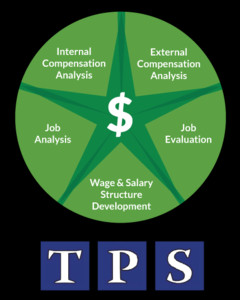Posted on Jul 1, 2019
When it comes to compensation, “benchmarking” has become one of the hottest terms around.
Accurate compensation benchmarking helps organizations maintain a competitive edge, ensure equitable and defensible pay practices, and comply with wage and hour laws. Compensation benchmarking is key to making data-driven decisions regarding what is likely the organizations largest expense Most organizations spend around 80% of gross revenue on employee compensation and benefits.
Ensuring equitable internal and external compensation has become critical in today’s environment. There is constant movement towards increased wage transparency and employers continue to struggle to find talent to fill critical positions. Now so more than ever, employers need to understand their pay practices, wage structure and comparison to the external market.
The term benchmark means to “evaluate or check by comparison with a standard”. In the compensation arena, the question becomes…what is the standard?
Before we explain what contributes to good compensation benchmarking standard, let’s review what the standard should not be.
The standard should not from be self-reported data, or data that is from a single source point. Unfortunately, there are many organizations and websites that gather and resell self-reported salary data. Many of these providers offer readily available salary data at no-cost or low cost. However, self-reported or single source data lacks the integrity, checks, and balances. Much of the free data online is submitted by individuals who may inflate their salary levels at will. Data that is self-reported or does not take into account factors of the position to be benchmarked is skewed and unreliable. Job titles alone should not be used when comparing compensation rates of positions. Comparisons to unreliable salary data can result in a skewed compensation structure and the employer underpaying or overpaying for certain positions.
What is a good standard? A good standard considers all the particulars of the position to benchmarked and compares it with dependable data.
Distinguishing factors such as the duties, knowledge, skill, complexity, experience, supervision, and geographic location are just some of the factors that should be all considered for a true “apples to apples” wage comparison.
Dependable data must be current and qualified. Important factors that determine the credibility of a salary data include:
Salary survey participants- Are the companies that you lose employees to or recruit employees from included in the report? This will determine the relevance and depth of data for your company.
Effective date of the compensation data – When was the data obtained and has it been aged (projected) through current date of benchmarking?
Relevance of the job descriptions to the positions being benchmarked – Quality surveys will provide job matching education and experience. A good match is considered to be at least 70 percent between the job details outlined in the survey and the position at your company. Be sure to compare job descriptions, not just job titles.
Survey methodology – Review the summary of the methodology to make sure it's consistent with standards set forth by reputable industry associations. Be sure that the research organization is surveying human resources or compensation professionals within a company.
When undertaking a compensation benchmarking project, it is imperative to rely on good standard data, ensure any salary surveys purchased are reputable and rely on consultative experts who analyze the particulars of jobs to ensure an “apples to apples” comparison to determine salary benchmarks.
Back to Blogs Helpful Resource Links
